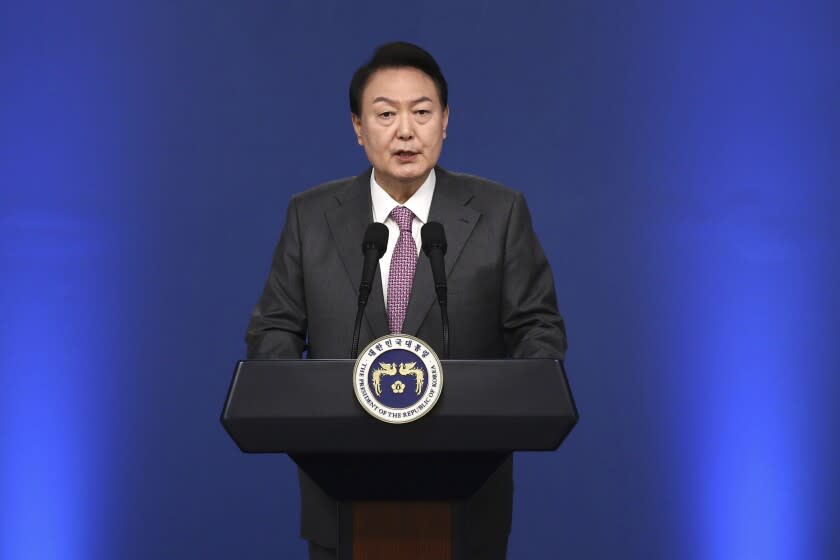South Korea will not seek its own nuclear deterrent, president says

South Korea’s president said Wednesday that his government has no plans to pursue its own nuclear deterrent and called instead for more diplomacy in the face of growing North Korean nuclear weapons capabilities, even as the North test-fired two suspected cruise missiles.
The launches were detected from North Korea’s western coast hours before South Korean President Yoon Suk-yeol used a news conference to urge Pyongyang to return to diplomacy aimed at exchanging denuclearization steps for economic benefits.
South Korea’s military, which didn’t reveal the launches until after Yoon’s remarks, provided no immediate flight details about the North’s weapons, including how they moved or how far they traveled.
Yoon’s office said his national security director, Kim Sung-han, discussed the launch with other senior officials before Yoon addressed reporters and that they reviewed the South’s military readiness. Tensions could further rise as the U.S. and South Korea kick off their biggest combined training in years next week to counter the North Korean threat. The North describes such drills as invasion rehearsals and has often responded to them with missile tests or other provocations.
During his news conference, Yoon maintained a reserved tone on Pyongyang, saying Seoul doesn’t desire political change in North Korea brought about by force and that the rivals should aim at building sustainable peace.
Yoon’s comments followed his proposal Monday for an “audacious” economic assistance package to North Korea if it abandons its nuclear weapons program. He has avoided harsh criticism of the North after it threatened “deadly” retaliation last week over a COVID-19 outbreak it blames on the South.
Yoon’s proposal for large-scale aid in food and healthcare and modernizing power and port infrastructure resembled previous South Korean offers that were rejected by North Korea, which is speeding up its development of nuclear weapons and ballistic missiles, seen by leader Kim Jong Un as his strongest guarantee of survival.
Still, Yoon expressed hope for “meaningful dialogue” with the North over his plan and stressed that Seoul was willing to provide corresponding economic rewards at each step of a phased denuclearization process if the North committed to a genuine “road map” toward fully abandoning its weapons program.
“We are not telling them to denuclearize entirely first and then we will provide,” Yoon said. “What we are saying is that we will provide the things we can in correspondence to their steps if they only show a firm determination" over denuclearization.
Inter-Korean ties have worsened amid a stalemate in larger nuclear negotiations between North Korea and the U.S.
North Korea has ramped up its missile testing to a record pace in 2022, launching more than 30 ballistic weapons so far, including its first intercontinental ballistic missiles in nearly five years.
The heightened testing activity underscores North Korea’s intention to advance its arsenal and force the U.S. to accept the idea of the North as a nuclear power so that it can negotiate economic and security concessions from a position of strength, experts say. Kim could up the ante soon, as there are indications that the North is preparing to conduct its first nuclear test since September 2017, when it claimed to have developed a thermonuclear weapon to fit on its ICBMs.
Yoon has vowed to strengthen the South’s defenses through its alliance with the U.S. by resuming large-scale military training that was canceled or downsized during the Trump years and boosting the South’s missile defenses. The Biden administration has also reaffirmed U.S. commitments to defending South Korea and Japan, including “extended deterrence,” referring to an assurance to defend its allies with its full military capabilities, including nuclear ones.
But some experts say it’s becoming clear South Korea has no clear way to counter the leverage North Korea has with its nukes, expressing concern that Washington might hesitate to defend its ally in the event of war when Kim’s ICBMs would pose a potential threat to mainland American cities.
Some South Koreans have called for the re-introduction of tactical U.S. nuclear weapons that were removed from the South in the 1990s, or for Seoul to pursue its own deterrent.
Yoon dismissed the possibility of the latter during the news conference, saying that Seoul would stay committed to an international treaty aimed at preventing the spread of nuclear weapons.
“I believe the NPT [Non-Proliferation Treaty] regime is a very important and necessary premise for permanent world peace,” Yoon said, expressing hope that the U.S. deterrence strategy for its allies could evolve to counter the North’s growing threat.
This story originally appeared in Los Angeles Times.

